800 Calorie Diet: 3-Day Plan To Manage Blood Sugar & Slim Down
Three days a week is all you need to turn your health around in the right direction.
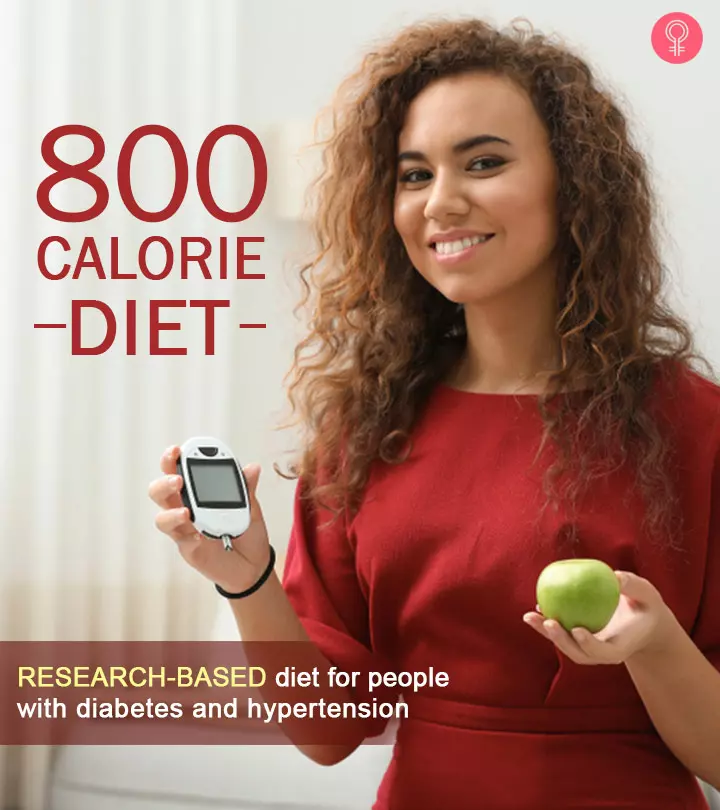
Image: StyleCraze
Have you ever heard of a diet that can keep all major health issues at bay? Well, it is the 800 calorie diet. Millions are being affected with high blood pressure, obesity, and type 2 diabetes (1), (2), (3), (4). But this diet effectively treats diabetes, helps lower blood pressure, and aids in weight loss (5), (6). Following this diet three days a week can address most health issues. Learn more about the 800 calorie diet, its benefits, and safety. Continue reading.

Note: The 800 calorie diet is a low-calorie diet and must be supervised by a registered dietician.
 At A Glance: 800-Calorie Diet
At A Glance: 800-Calorie Diet- Principle: Supervised Very Low Calorie Diet (VLCD) of 800 calories
- Purpose: To promote rapid weight loss, boost sleep quality and energy levels, and reduce inflammation and risk of hypertension and type 2 diabetes
- Who It Is For: People who are obese or have diabetes, hypertension
- Duration: Short-term
- Who Should Avoid: People who are not obese, have hypoglycemia, are pregnant, or are lactating
- Cons: Fatigue, diarrhea, or nausea; long-term use may cause kidney, liver, and heart problems
In This Article
800-Calorie Diet – What Is It?
The 800-calorie diet is a very low calorie diet (VLCD) that allows consuming a total of 800 calories per day. A supervised 800-calorie diet helps in rapid weight loss, reverses type 2 diabetes, regulates blood sugar levels, and lowers high blood pressure.
It is also a part of the Blood Sugar Diet, popularized by Dr. Michael Mosley. In the blood sugar diet, dieters first go on an 800-calorie diet for eight weeks. Then, the dieters follow a 5:2 diet pattern, consuming 800 calories for two days and 1500 calories for five days.
In this post, we discuss 800 calories for three days a week for a month. It will give you the following benefits.
Key Takeaways
- The 800-calorie diet helps manage diabetes, reduce blood pressure, and decrease weight.
- This diet contains foods rich in dietary fiber, proteins, and complex carbs.
- Pair this diet plan with yoga, meditation, and a daily workout regimen for best results.
- The 800-calorie diet is for overweight and obese people. It should not be used just to lose a flab as such a low calorie diet may cause adverse effects.
3-Day 800-Calorie Diet Benefits

- Aids weight loss – Kick-starts metabolism and fat mobilization, helps in portion control, and reduces the risk of metabolic syndrome in people with obesity (7), (8), (9).
- Reduces the risk of diseases – Weight loss helps reset normal biological functions and hormone actions. A supervised 800-calorie diet helps reduce the risk of type 2 diabetes, hypertensioni A rise in blood pressure beyond what is considered normal, due to dietary factors and high movement activities. , heart problems, digestive issues, and infertility (9).
- Improves energy levels – Going on a low-fat diet for a few days, avoiding unhealthy food, and leading a healthy lifestyle will improve your energy levels and make you proactive.
- Reduces inflammation – Healthy, calorie-restricted eating for a few days a week helps reduce inflammation (10). This, in turn, reduces the chances of inflammation-induced obesity.
- Reduces sleep apnea – Going on a very low-calorie diet helps reduce weight. This, in turn, reduces sleep apneai a disorder of breathing issues during sleep, resulting in loud snoring and even after a full night’s sleep the person still feels tired. (11).
When following an 800-calorie diet plan, you should consume nutritious foods that keep you from feeling hungry. This will help you stay within your calorie limit while also getting the essential nutrients your body needs. Scroll down to explore the list of foods to eat and avoid.
Food To Eat And Avoid In The 800-Calorie Diet
Here is a list of some common food items that you can consume:
- Vegetables and fruits
- Wholegrains like oats and quinoa
- Nuts and seeds
- Legumes like kidney beans and chickpeas
- Eggs and dairy
- Seafood like salmon and tuna
- Lean meats like chicken breast and turkey
- Plant-based proteins like tofu and tempeh
Here is a list of some common food items that you should avoid:
- Processed and fried foods like French fries, crackers, and chips
- Refined carbohydrates like white bread and pasta
- Foods with added sugars like cereal, and chocolates
- High-calorie condiments like heavy cream and mayonnaise
- Carbonated and sugary drinks like sodas
Follow this sample 3-day 800-calorie meal plan to reap all the benefits mentioned above.
800-Calorie Diet Plan – What It Looks Like
Day 1
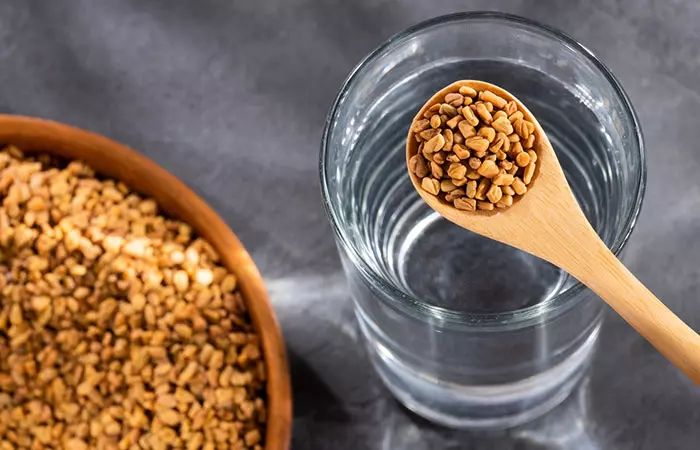
| What To Eat | Meals |
|---|---|
| Early Morning (7:30 – 8:00 a.m.) | 2 teaspoons fenugreek seeds soaked in a cup of water |
| Breakfast (8:45 – 9:15 a.m.) | Options ● Oatmeal with ½ apple, blueberries, and 4 almonds ● 2 boiled egg whites + 1 cup milk + ½ cup papaya |
| Lunch (12:00 – 12:30 p.m.) | Options ● 1 cup chicken clear soup ● 1 cup sauteed veggies |
| Evening Snack (4:00 p.m.) | 1 cup green tea |
| Dinner (7:00 p.m.) | Options ● 3 oz baked salmon and 1 cup blacked or boiled veggies ● 1 cup baked black beans and sauteed veggies |
Why This Works
Fenugreek seed water is great for increasing insulin sensitivity and reducing the risk of type 2 diabetes (12). It is also an effective addition to your weight loss plan. Have a substantial breakfast that contains dietary fiber, protein, and complex carbs. Keep the lunch as light as possible and nutritious. Green tea has no calories and is a good source of antioxidantsi Man-made and natural molecules that help to fight free radicals and reduce cell and photo damage in the body. that will help flush out toxins from the body. Have a delicious dinner that is nutritious but low in calories.
Day 2
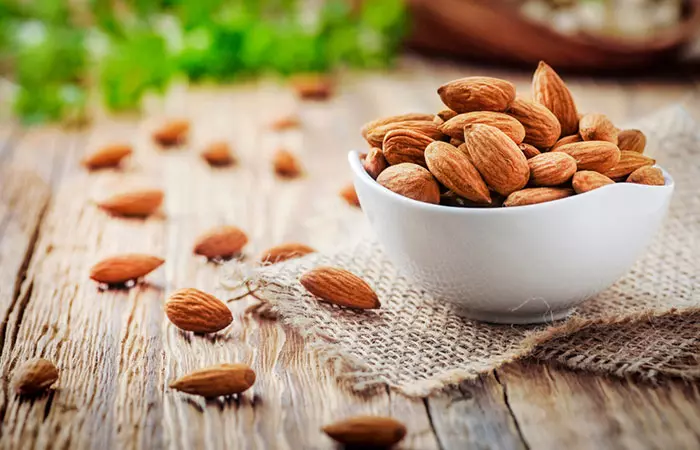
| Meals | What To Eat |
|---|---|
| Early Morning (7:30 – 8:00 a.m.) | 2 teaspoons fenugreek seeds soaked in a cup of water |
| Breakfast (8:45 – 9:15 a.m.) | Options ● Kale and pomegranate smoothie + 2 almonds ● 1 cup vegetable quinoa |
| Lunch (12:00 – 12:30 p.m.) | Options ● 2 lettuce wraps with cucumber, tomato, and tofu ● Tuna salad with olive oil and lime juice dressing |
| Evening Snack (4:00 p.m.) | Green tea or grapefruit juice |
| Dinner (7:00 p.m.) | Options ● 1 baked bell pepper stuffed with chickpea ● 3 oz grilled chicken breast with 1 cup baked veggies |
Why This Works
Continue drinking fenugreek soaked water to sensitize your cells to insulin. Kale, pomegranate, and quinoa are loaded with vitamins, minerals, and dietary fiber. Therefore, you will not feel hungry for at least 2 hours. Almonds are great sources of healthy fats that reduce inflammation and maintain cellular health. A light yet nutritious lunch will keep you active as you will not feel weighed down. Green tea and grapefruit have weight loss-aiding properties (13), (14). Have a tasty and filling high-protein diet as your last meal of the day.
Day 3
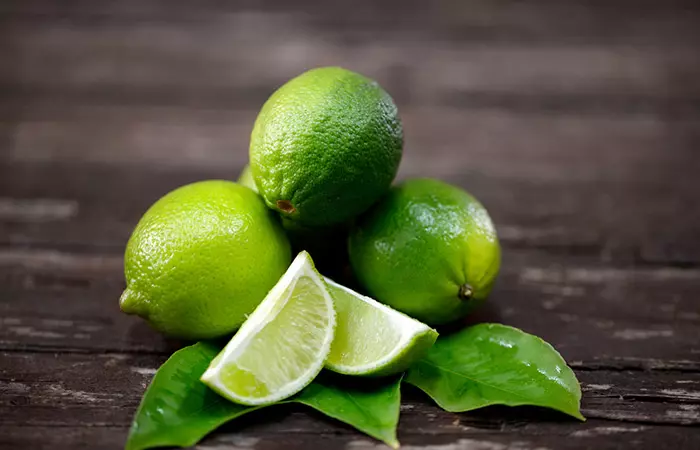
| Meals | What To Eat |
|---|---|
| Early Morning (7:30 – 8:00 a.m.) | 1 cup warm water with lime juice and honey |
| Breakfast (8:45 – 9:15 a.m.) | Options ● 1 boiled egg + 1 cup fat-free milk + ½ apple ● Apple, almond milk, and chia seed smoothie |
| Lunch (12:00 – 12:30 p.m.) | Options ● 1 cup mushroom clear soup ● 2 oz smoked ground turkey with blanched spinach and fresh tomatoes |
| Evening Snack (4:00 p.m.) | Green tea |
| Dinner (7:00 p.m.) | Options ● 1 cup squash soup ● Asian style sautéed chicken and veggies |
Why This Works
Lime is rich in vitamin C, and honey is loaded with antibacterial properties
. Have a substantial breakfast before heading out. Explore healthy and nutritious lunch and dinner options on the third day. It will help you cut down on calories aid in appetite suppression and keep your hunger pangs at bay. Green tea should be your go-to drink on this day.
Tip: Stay hydrated all the three days. Drink water, green tea, or coconut water if you feel hungry.
 Quick Tip
Quick TipContinue being on this 3-day 800 calorie diet for a month. On the non-diet days, you must get your body moving to expend the calories. Here’s an exercise plan you may follow.
800-Calorie Diet Workout Plan

You must stay active on the days you are NOT on the 800-calorie diet. It will also prevent you from stopping losing weight. Here’s what you may do.
- Neck rotations – 1 set of 10 reps
- Shoulder rotations – 1 set of 10 reps
- Arm circles – 1 set of 10 reps
- Wrist rotations – 1 set of 10 reps
- Waist rotations – 1 set of 10 reps
- Ankle rotation – 1 set of 10 reps
- Spot jogging – 3-7 minutes
- Mountain climbers – 1 set of 10 reps
- Jumping jacks – 1 set of 10 reps
- Scissor kicks – 1 set of 10 reps
- Horizontal out kicks – 1 set of 10 reps
- Squats – 1 set of 10 reps
- Jump squats – 1 set of 10 reps
- Burpees – 1 set of 10 reps
- Crunches – 1 set of 10 reps
- Jumping forward lunges – 1 set of 10 reps
- Pushups – 1 set of 10 reps
- Plank – 2 sets of 20 seconds hold
- Yoga for weight loss
- Meditation
How will you feel at the end of one month? Let’s find out below:
How Will You Feel After 1 Month?
After being on a 3-day a week 800-calorie diet for a month, you will lose weight, look slimmer, your metabolic rate will be faster, you will feel more energetic and positive, and your stress levels will reduce.
A blogger shared how she lost weight with VLCD after a life-changing car accident and subsequent health challenges in her blog post. She said, “So I’ve been following that for 4 weeks now and have lost over 2&1/2 stones so far (i)”.
Your new lifestyle changes will make you fall in love with healthier habits, and you will enjoy being in a better place health-wise. You will be proud of yourself for taking the step ahead and successfully completing one month of the 800-calorie diet. But before you start being on the 800 calorie diet, you must know about its safety.
Is The 800-Calorie Diet Safe?
Yes, a very low-calorie diet is safe (15). But there is the possibility of going wrong if you misuse or abuse it.
Women require 2000 calories per day to maintain their weight and physiological functions. To lose weight, women need to consume only about 1500 (or less) calories per day (16). But if you are overweight or obese, which may give rise to life-threatening and debilitatingi a condition that causes serious impairment of strength and ability to function where it weakens someone mentally and physically. diseases, going on a supervised VLCD is a smart choice.
What if you do not have obesity, diabetes, and/or hypertension and want to use this diet to lose a bit of flab? You must know that the 800-calorie diet is NOT for people who want to lose a bit of flab. You can go for intermittent fastingi A fasting and non-fasting schedule used to lose weight (eating in a period of 8 hours and fasting for 16 hours). or a 1200-calorie diet plan instead!
Here’s a list of precautions that you should take if you go on the 800-calorie diet to lose weight or improve your health.
800-Calorie Diet Precautions And Safety
- Dietitian supervision is advised before starting this diet plan
- A sudden change in the diet affects the body in more ways than one. Do not force it on the body, as too great a caloric deficit may result in fatigue and diarrhea. Give your body some time to adjust to the diet.
- Do not overdo it. It may be important and healthy to lose a few pounds, but take breaks between weeks. Continuous nutrient deficiencies may result in long-term problems in the kidney, liver, and heart functions.
- You may feel nauseous and weak. Inform your doctor immediately.
- Do not follow this diet if you have hypoglycemiai a condition when the blood sugar levels are lower than normal. Causing blurred vision, drowsiness, speech numbness and more. .
- Do not follow this diet if you are pregnant or lactating.
 Quick Tip
Quick TipWondering how the 800-calorie diet compares to other popular diets? Find out in the next section. Keep reading!
800-Calorie Diet Vs. Other Diets
An 800-calorie diet dramatically reduces daily caloric intake to promote rapid weight loss. Due to this, VLCD can be difficult to sustain and may lead to nutrient deficiencies if not carefully managed.
In contrast, other dietary practices, such as the Mediterranean plan and intermittent fasting do not involve severe caloric restrictions. Instead, they focus on longer-term lifestyle changes. The Mediterranean diet emphasizes balanced nutrition and is known for its cardiovascular benefits (17). Intermittent fasting involves alternating between periods of eating and fasting, allowing the body to burn fat during the fasting window while still consuming a normal range of calories on eating days (18). Unlike VLCD, these diets are easier to maintain over time and promote steady weight loss without extreme caloric restrictions.
It’s always better to work with a nutritionist and dietitian to ensure you are not depriving your body of the necessary nutrients. If possible, instead of switching to a very low calorie diet, try cutting down calories gradually. A calorie-deficit diet gives your body the time to adjust to reduced food intake.
Infographic: 5 Benefits Of The 800-Calorie Diet
This very low calorie diet has quite a few health benefits when done under medical supervision and in a controlled manner. One of them is sustainable weight loss. Check out the infographic below to know about some of the others.
Some thing wrong with infographic shortcode. please verify shortcode syntax
The 800-calorie diet is a very low-calorie diet (VCLD) that aims at cutting down your calorie intake drastically from the usual 2,000 calories a day. It comprises a nutritionally balanced breakfast rich in protein, fiber, and complex carbs followed by a light lunch and a nutritious yet low-calorie dinner. It also recommends drinking fenugreek-soaked water and green tea for their weight loss effects. Following this diet three days a week may enhance your metabolism and help manage type-2 diabetes, hypertension, and obesity. However, always consult your doctor before starting any diet, especially one as restrictive as the 800-calorie diet. They can help determine if the diet is safe and appropriate for your health needs.
Frequently Asked Questions
Is it recommended to survive on 800 calories a day?
Ideally, it is not a healthy option for everyone. As Mary Sabat, RDN, says, “It is not recommended to survive on 800 calories a day as it is not a sustainable or healthy diet. The minimum calories required per day is 1,200-1,500, depending on age, gender, and activity level. Calorie goals should be based on body weight and activity, and falling below 1200 calories would make it impossible to meet nutrient needs for health.”
Are diet coke and coffee included in this Fast 800 diet?
No. Diet coke is not allowed during this diet. However, you can have coffee. Sabat recommends drinking it without added sugars or creamers.
How long should you be on this diet?
Be on this 3-day per week 800-calorie diet for a month. You may continue being on it for 2 months.
Can I lose weight eating 800 calories a day?
Yes, you can lose weight eating 800 calories thrice a week. Do not follow this every day as it will lead to weakness and compromised immunity. If you have a special occasion to attend, you may try intermittent fasting.
How much weight will I lose on the 800 calorie diet?
You will lose up to 10 pounds (4.5 kgs) if you consume 800 calories and exercise regularly. Make sure your doctor or nutritionist is aware of your diet pattern.
Can I drink alcohol on the Fast 800?
It is not recommended to drink alcohol while you are on the Fast 800. If you must, you may have a glass of wine, but keep in mind that it may affect your results.
How many carbs can I have on Fast 800?
The Fast 800 diet takes into consideration the total calorie intake and not carbohydrate intake. However, if you want to do a keto version of the Fast 800 diet, you need to keep your net carbs below 50 grams each day. If you prefer long term healthy results over quick goals, consider a more gradual meal plan, like a 2000 calorie diet, which allows for a balanced intake while still promoting steady weight loss over time.
Illustration: 800-Calorie Diet: VLCD For Weight Loss, Diabetes, And High BP
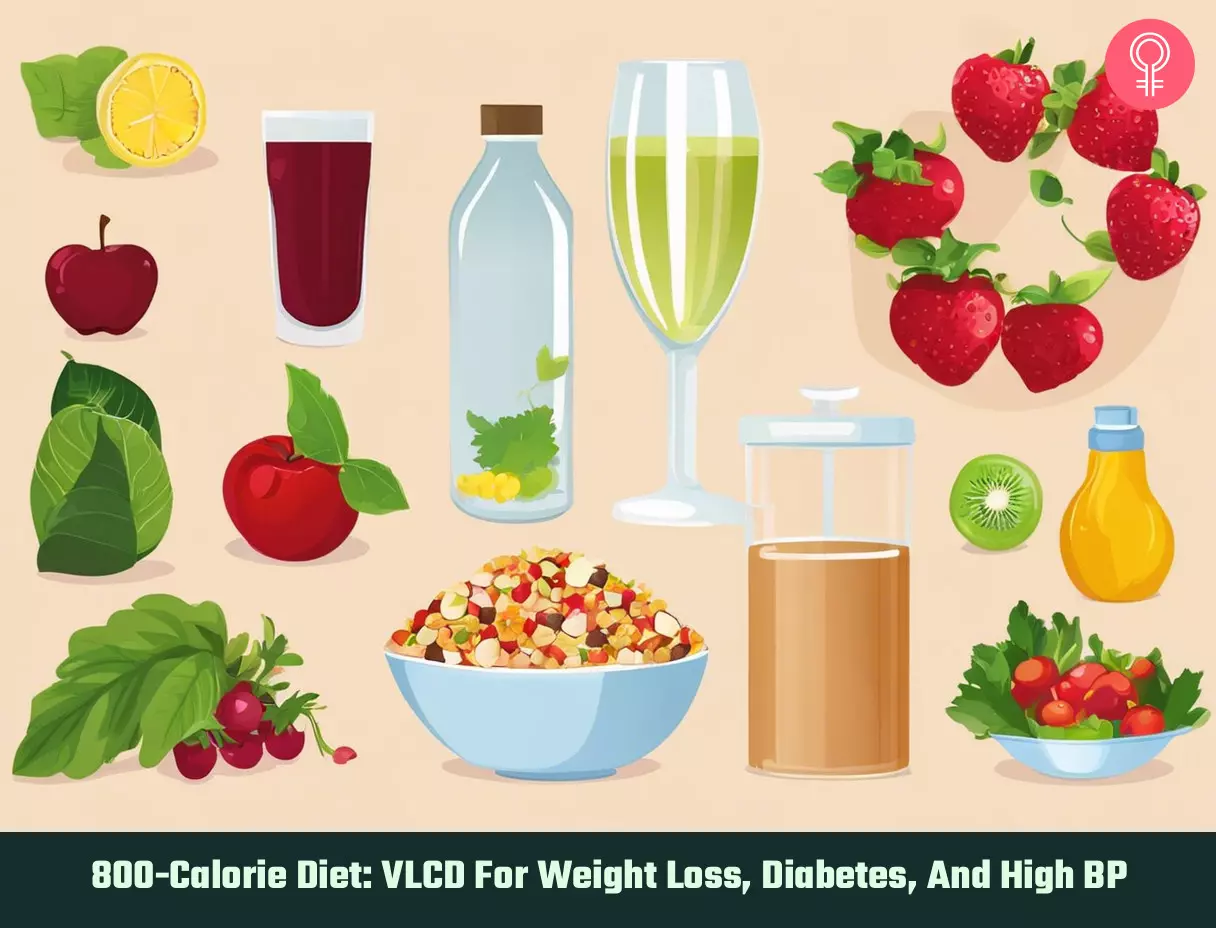
Image: Stable Diffusion/StyleCraze Design Team
References
Articles on StyleCraze are backed by verified information from peer-reviewed and academic research papers, reputed organizations, research institutions, and medical associations to ensure accuracy and relevance. Read our editorial policy to learn more.
- “World Obesity Day.” World Health Organization.
www.who.int/news-room/events/detail/2025/03/04/default-calendar/world-obesity-day - “Obesity and Overweight.” World Health Organization.
www.who.int/news-room/fact-sheets/detail/obesity-and-overweight - Global and regional diabetes prevalence estimates for 2019 and projections for 2030 and 2045: Results from the International Diabetes Federation Diabetes Atlas, 9th edition
https://pubmed.ncbi.nlm.nih.gov/31518657/ - “Hypertension.” World Health Organization.
www.who.int/news-room/fact-sheets/detail/hypertension - Li, Z et al. “Clinical efficacy of a medically supervised outpatient high-protein, low-calorie diet program is equivalent in prediabetic, diabetic and normoglycemic obese patients.” Nutrition & diabetes vol. 4,2 e105.
https://www.ncbi.nlm.nih.gov/pmc/articles/PMC3940825/ - Nakano, Y et al. “Calorie restriction reduced blood pressure in obesity hypertensives by improvement of autonomic nerve activity and insulin sensitivity.” Journal of cardiovascular pharmacology vol. 38 Suppl 1 (2001): S69-74.
https://pubmed.ncbi.nlm.nih.gov/11811363/ - Tančić-Gajić, M et al. “Effects of alternate fasting or very low calorie diet and low calorie diet on metabolic syndrome in severely obese patients.” Hippokratia vol. 16,4 (2012): 335-41.
https://www.ncbi.nlm.nih.gov/pmc/articles/PMC3738608/ - National Clinical Guideline Centre (UK). Obesity: Identification, Assessment and Management of Overweight and Obesity in Children, Young People and Adults: Partial Update of CG43. London: National Institute for Health and Care Excellence (UK); 2014 Nov. (NICE Clinical Guidelines, No. 189.) 6, Very-low-calorie diets.
https://www.ncbi.nlm.nih.gov/books/NBK311324/ - Ruban, Aruchuna et al. “Current treatments for obesity.” Clinical medicine (London, England) vol. 19,3 (2019): 205-212.
https://www.ncbi.nlm.nih.gov/pmc/articles/PMC6542229/ - Ott, Beate et al. “Effect of caloric restriction on gut permeability, inflammation markers, and fecal microbiota in obese women.” Scientific reports vol. 7,1 11955.
https://www.ncbi.nlm.nih.gov/pmc/articles/PMC5607294/ - Kansanen, M et al. “The effect of a very low-calorie diet-induced weight loss on the severity of obstructive sleep apnoea and autonomic nervous function in obese patients with obstructive sleep apnoea syndrome.” Clinical physiology (Oxford, England) vol. 18,4 (1998): 377-85.
https://pubmed.ncbi.nlm.nih.gov/9715765/ - Gaddam, Arpana et al. “Role of Fenugreek in the prevention of type 2 diabetes mellitus in prediabetes.” Journal of diabetes and metabolic disorders vol. 14 74.
https://www.ncbi.nlm.nih.gov/pmc/articles/PMC4591578/ - Silver, Heidi J et al. “Effects of grapefruit, grapefruit juice and water preloads on energy balance, weight loss, body composition, and cardiometabolic risk in free-living obese adults.” Nutrition & metabolism vol. 8,1 8.
https://pubmed.ncbi.nlm.nih.gov/21288350// - Huang, J et al. “The anti-obesity effects of green tea in human intervention and basic molecular studies.” European journal of clinical nutrition vol. 68,10 (2014): 1075-87.
https://pubmed.ncbi.nlm.nih.gov/25074392// - Rössner, S, and J S Torgerson. “VLCD säker och enkel behandling av fetma” [VLCD a safe and simple treatment of obesity]. Lakartidningen vol. 97,36 (2000): 3876-9.
https://pubmed.ncbi.nlm.nih.gov/11036337/ - Calories
https://www.ncbi.nlm.nih.gov/books/NBK499909/ - The Mediterranean diet: an update of the clinical trials
https://www.ncbi.nlm.nih.gov/pmc/articles/PMC9317652/ - Intermittent fasting: benefits, side effects, quality of life, and knowledge of the Saudi population
https://www.ncbi.nlm.nih.gov/pmc/articles/PMC9998115/
Read full bio of Merlin Annie Raj
- Mary Sabat, MS, RDN, LD, is a registered dietitian and a certified in personal training by the American Council of Exercise. She has 30 years of experience in nutrition education, wellness coaching, fitness training, holistic health, and weight loss coaching. She obtained her bachelor's degree in Dietetics and Nutrition from the University of Delaware and master’s degree in Human Nutrition with an emphasis on Exercise Science from Rutgers University.
 Mary Sabat, MS, RDN, LD, is a registered dietitian and a certified in personal training by the American Council of Exercise. She has 30 years of experience in nutrition education, wellness coaching, fitness training, holistic health, and weight loss coaching. She obtained her bachelor's degree in Dietetics and Nutrition from the University of Delaware and master’s degree in Human Nutrition with an emphasis on Exercise Science from Rutgers University.
Mary Sabat, MS, RDN, LD, is a registered dietitian and a certified in personal training by the American Council of Exercise. She has 30 years of experience in nutrition education, wellness coaching, fitness training, holistic health, and weight loss coaching. She obtained her bachelor's degree in Dietetics and Nutrition from the University of Delaware and master’s degree in Human Nutrition with an emphasis on Exercise Science from Rutgers University.
Read full bio of Ravi Teja Tadimalla
Read full bio of Sindhu Koganti







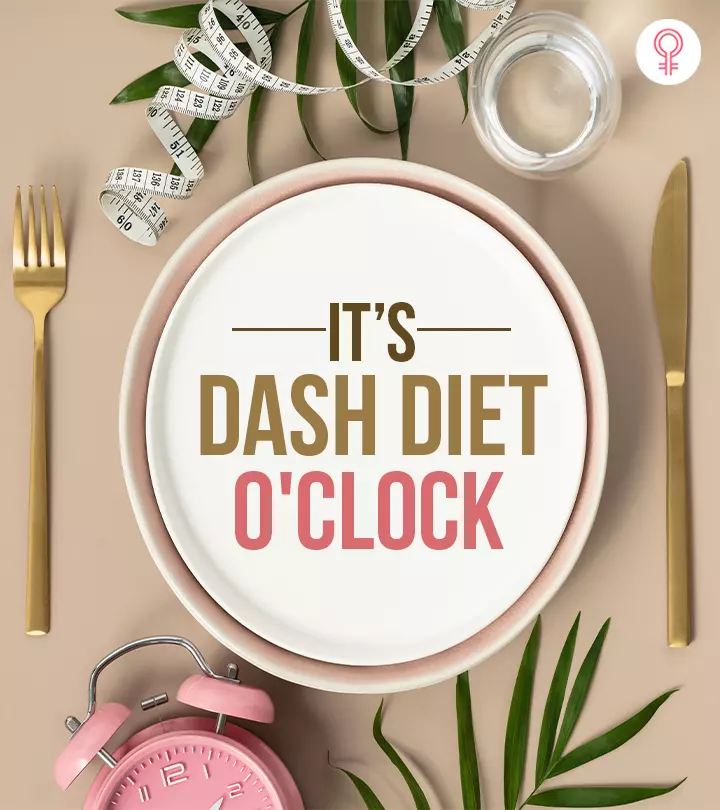


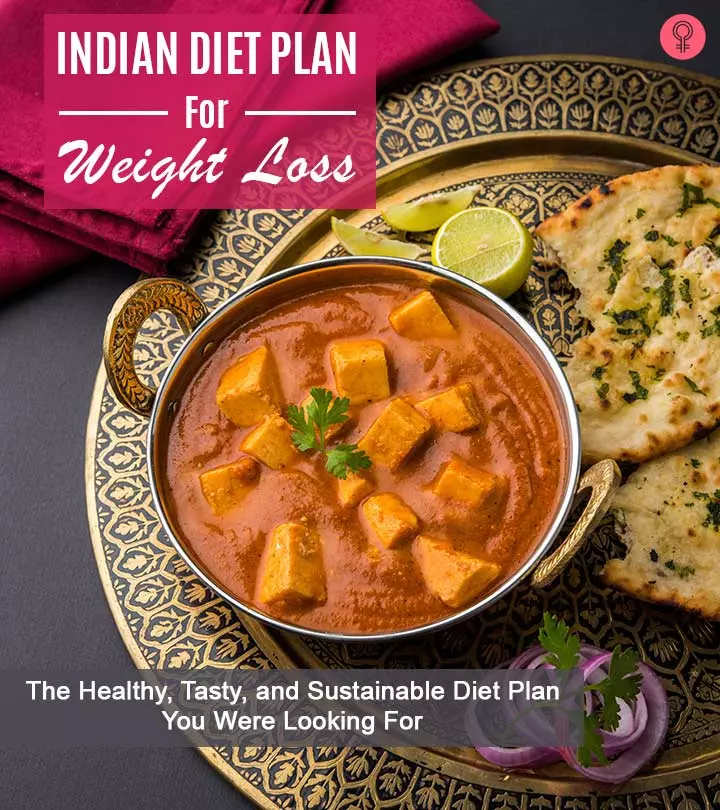
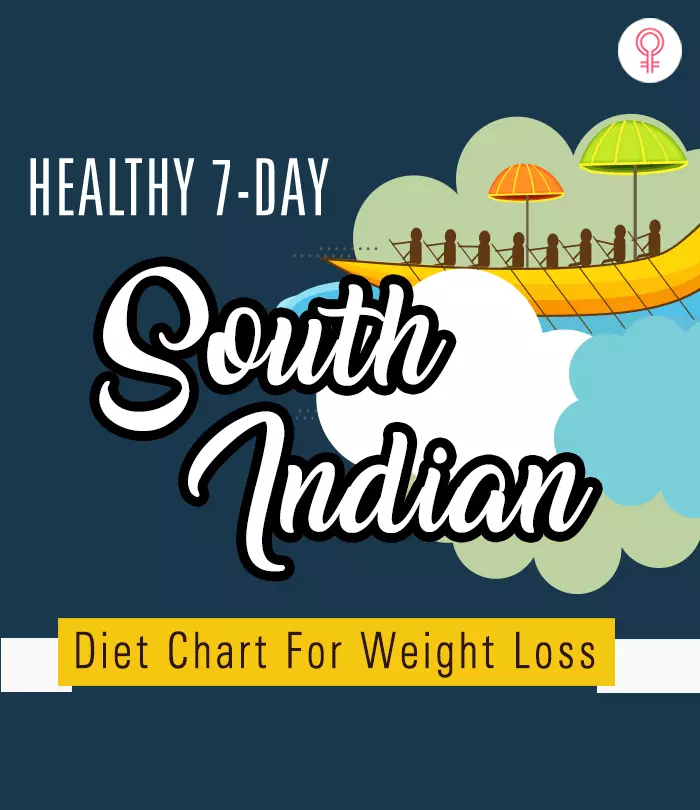
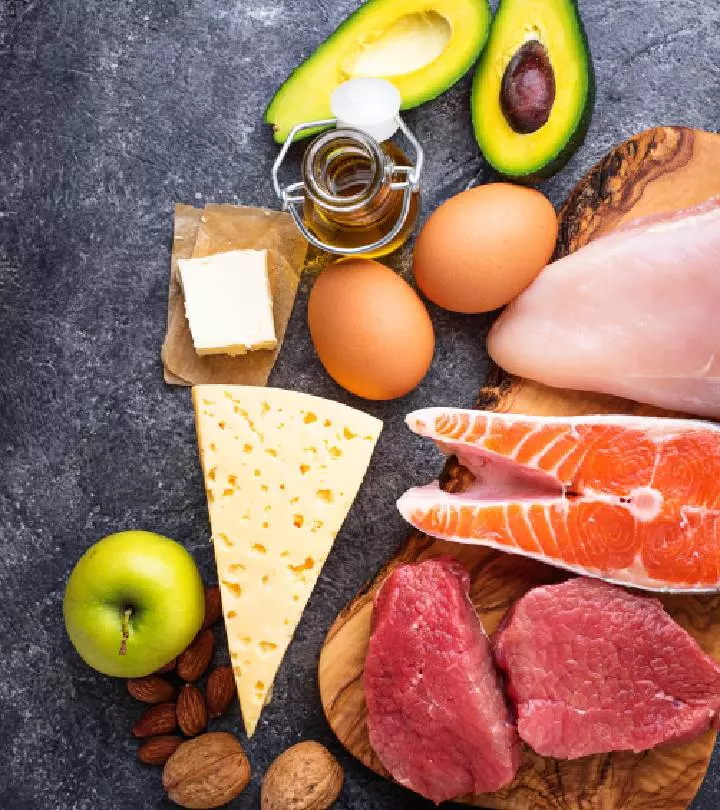

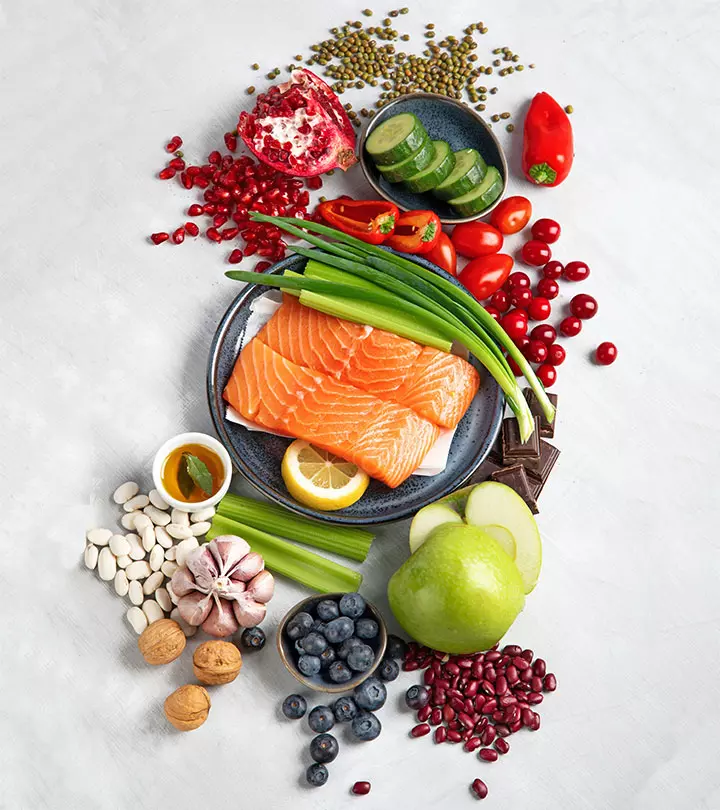
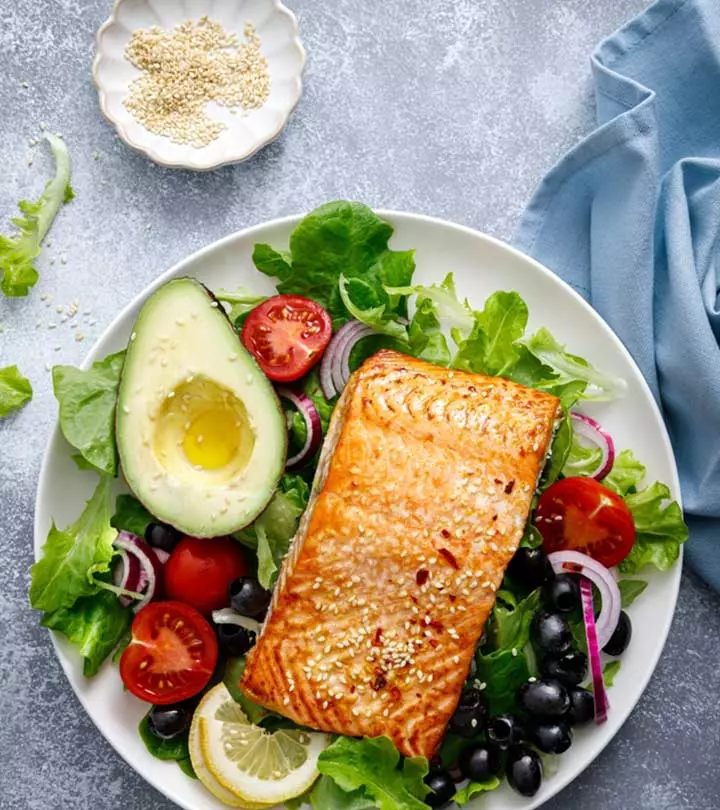

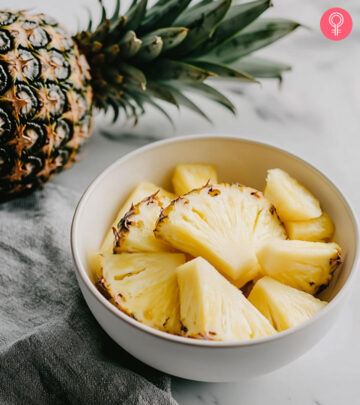
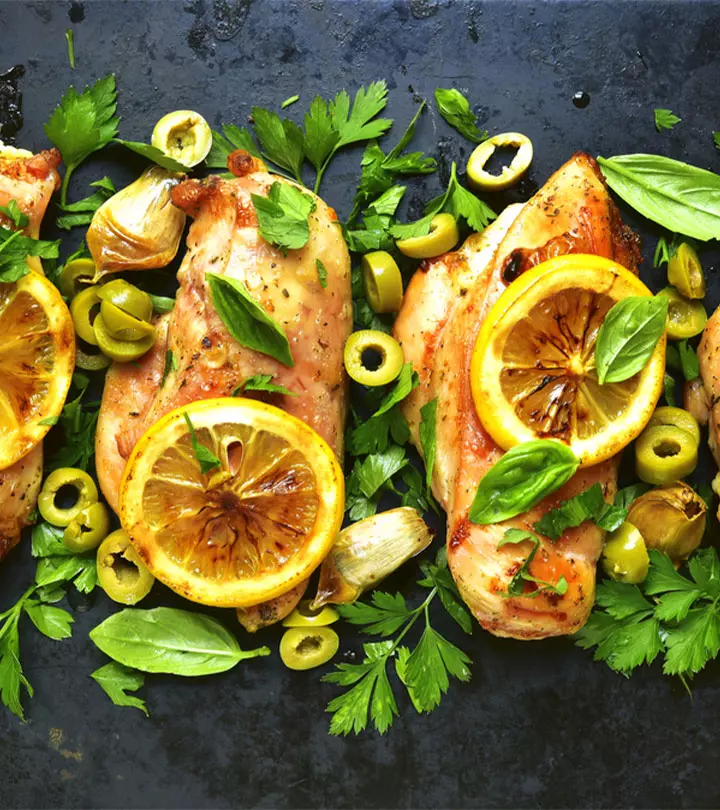
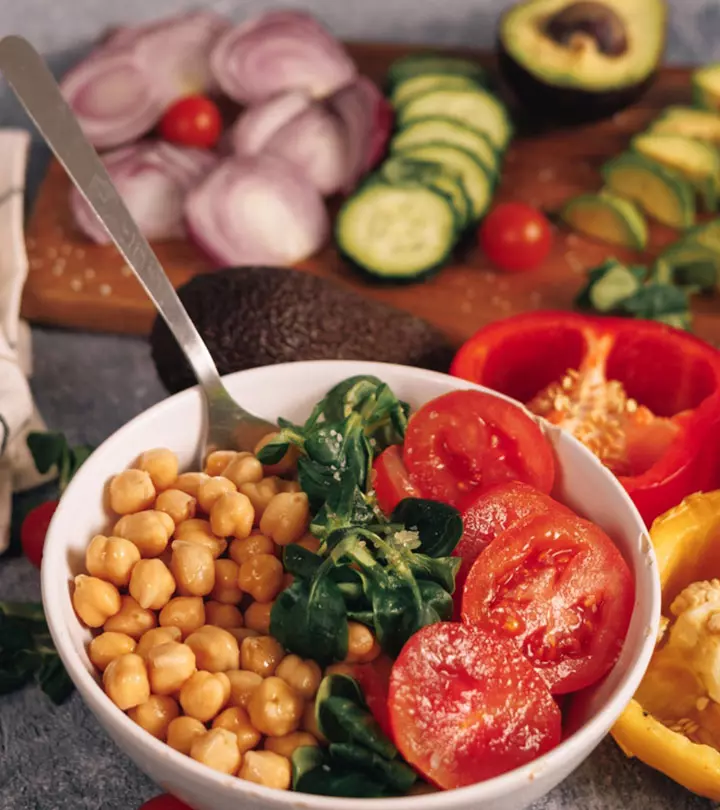
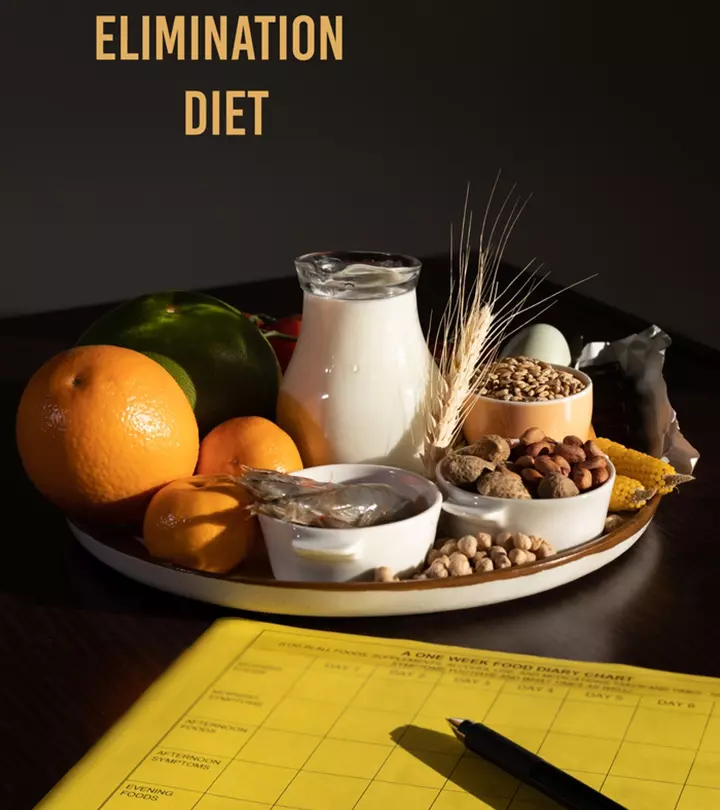

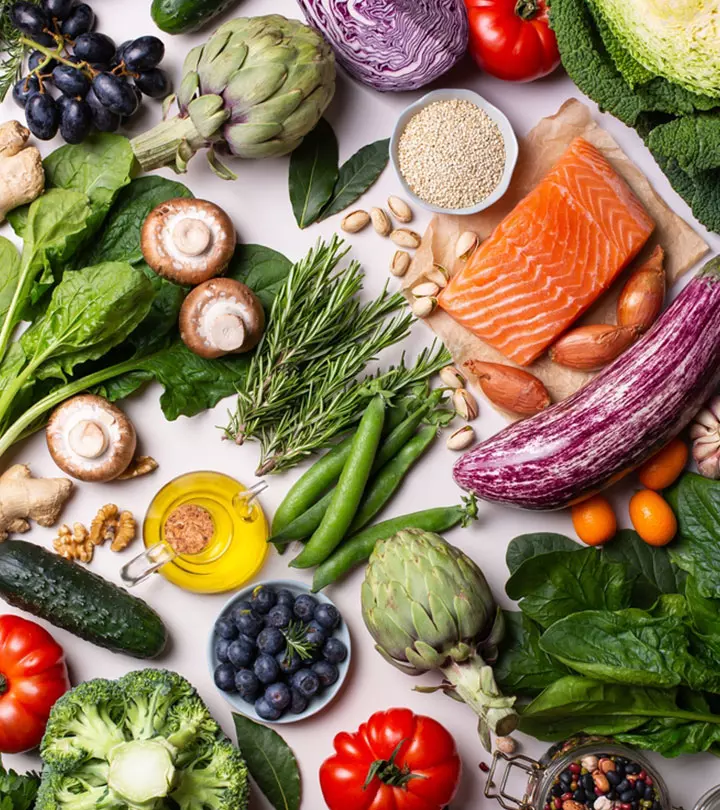

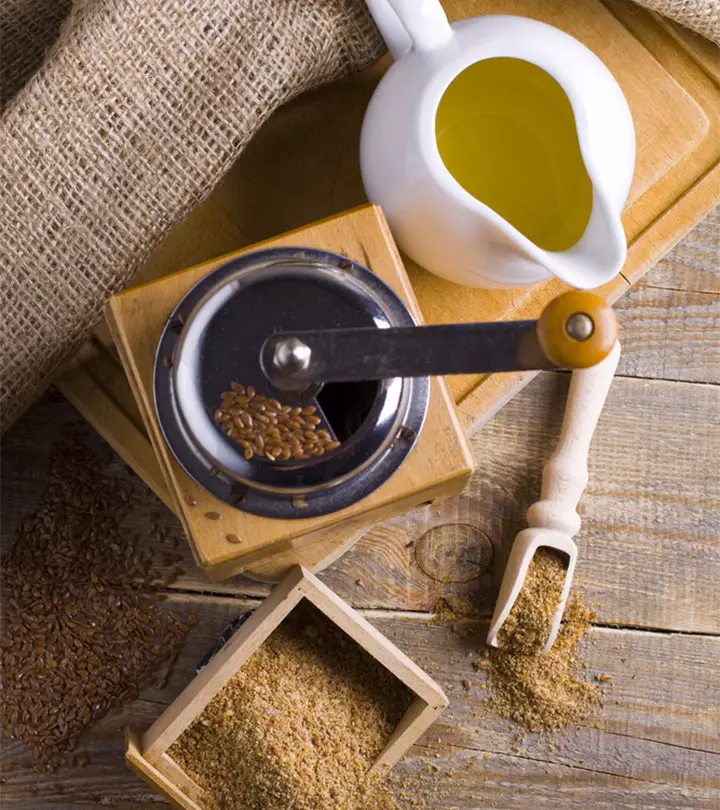
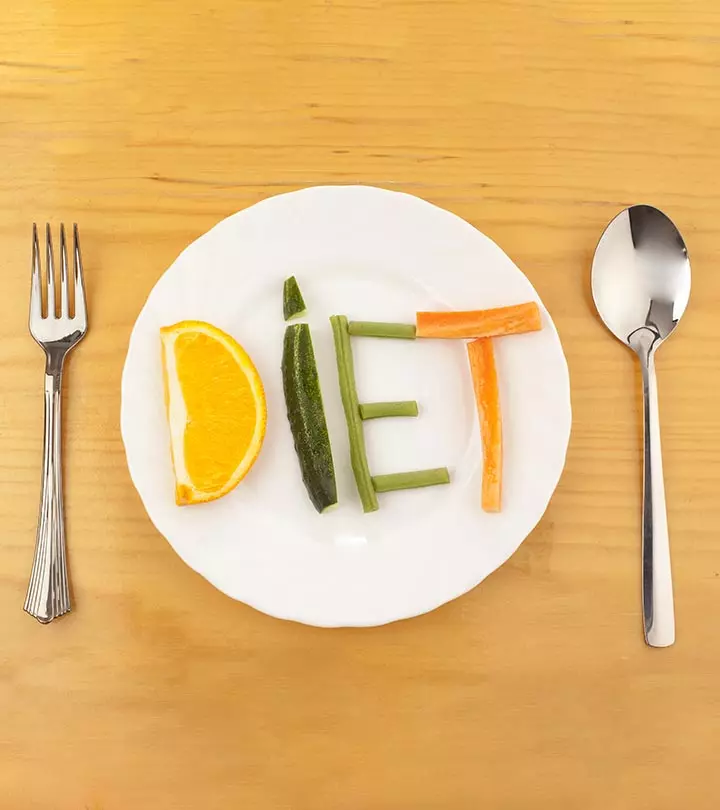
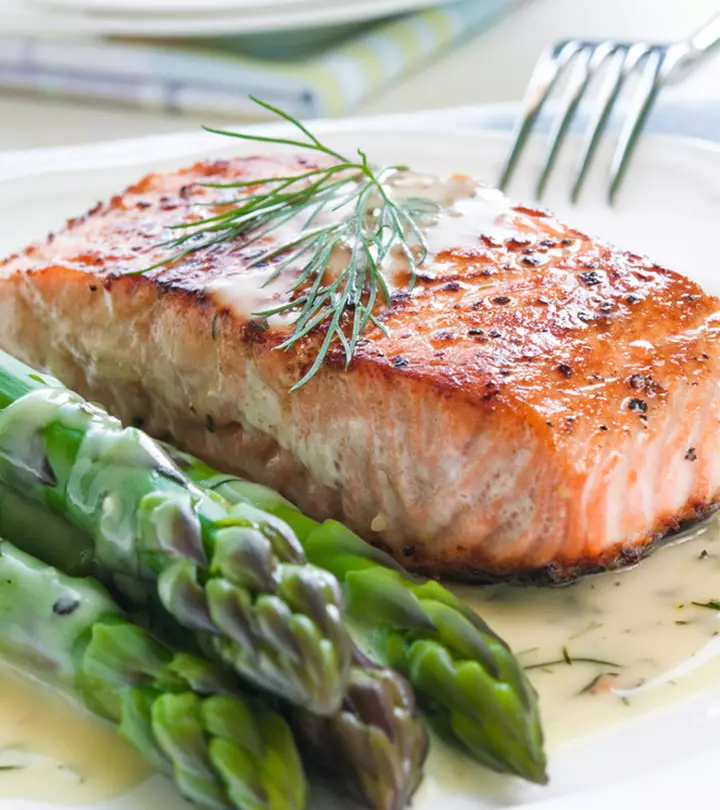
Community Experiences
Join the conversation and become a part of our empowering community! Share your stories, experiences, and insights to connect with other beauty, lifestyle, and health enthusiasts.